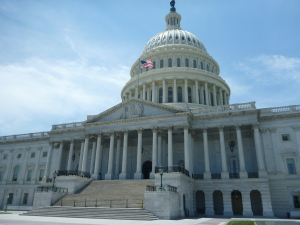The U.S. House voted April 16 to repeal the estate tax, a longtime priority of Republicans that also spurred Democratic charges that the GOP is in the pockets of the rich.
GOP is in the pockets of the rich.
The 240 to 179 vote on the bill, sponsored by Rep. Kevin Brady, R-TX, broke down largely on partisan lines, with seven Democrats, including House Agriculture Committee ranking member Collin Peterson of Minnesota, voting to repeal the estate tax and three Republicans voting against it.
The House last voted to end the estate tax a decade ago—meaning, as Majority Whip Steve Scalise, R-LA, put it in a recent issue of the influential publication The Hill, “the vast majority of our members in the Republican conference have never had the opportunity to stand up for small businesses who are threatened by the death tax everyday.”
Sen. John Thune, R-SD, a member of GOP leadership, has introduced legislation across the Capitol to repeal the estate tax. But Majority Leader Mitch McConnell, R-KY, hasn’t said when or if that proposal might get a vote.
Fifty-four senators went on record in March as supporting estate tax repeal, as part of a non-binding budget resolution vote, The Hill reported. But that also leaves supporters six votes short of the 60 regularly needed to clear legislation.
Killing off the estate tax would increase the deficit by $269 billion over a decade.
The Joint Committee on Taxation projects that the estate tax will hit 5,400 estates in 2015, or roughly 0.2 percent of the 2.6 million deaths expected in the U.S. this year.
Under current law, individuals with estates of under $5.43 million this year, and couples with $10.86 million estates, are exempt from paying the tax. Estates pay a maximum rate of 40 percent on the amount of assets above those levels.
The vote to repeal the estate tax comes as the 2016 presidential campaign is starting to heat up, and as GOP candidates are grappling with how to deal with rising income inequality in the U.S.
Nonetheless, Republicans believe they have a powerful argument for repealing what they believe is an immoral tax that resonates with voters across the economic spectrum.
Republicans argue people are taxed every step along the way as they accumulate assets, meaning their heirs shouldn’t have to worry about the estate tax once they die. The estate tax, they add, is more likely to hit family farms and small businesses than the ultra-wealthy who can afford complex estate planning.
House Agriculture Committee chairman Mike Conaway, R-TX, issued a statement following the vote, praising the bill.
“As a CPA, I know from experience that the ‘death tax’ hurts individuals who have worked hard and saved all of their lives in order to build up a nest egg for themselves and their families. Farmers and ranchers are hit especially hard, because their assets are primarily land and equipment,” Conaway said. “When a farmer or rancher passes away, even though he has already paid taxes on everything he owns, the sons and daughters who want to carry on the family tradition will first have to get over the hurdle of a whopping tax penalty that can reach as high as 60 percent.
“Why would we do that to young people wanting to stay on the farm or ranch? The death tax hurts not only that next generation of farmers and ranchers, but it hobbles an important sector of our economy that creates economic activity and jobs. A repeal of the death tax is long overdue.”
Farm groups were mixed in their reaction to the vote. American Farm Bureau Federation President Bob Stallman said in a statement it brings farmers and ranchers one step closer to tax reform that will help their families invest in the future and pass their businesses onto the next generation.
“Farmers’ and ranchers’ assets are tied up in the land, not sitting in a bank. And farm families certainly don’t have cash on hand to pay a double tax at death,” Stallman said. “This leaves many surviving family members with few options other than selling off part or all of their land to pay estate taxes. Too often, cashing in these assets can cripple their business.”
Many farmers have benefited greatly from previous congressional action that increased the estate tax exemption to $5 million indexed for inflation, provided portability between spouses and continued stepped-up basis, Stallman said in a letter urging House lawmakers to approve the repeal bill.
Instead of spending money on life insurance and estate planning, many farmers today can expand their businesses; upgrade buildings and purchase needed equipment and livestock, Stallman said.
“And more importantly, they can continue farming when a family member dies without having to sell land, livestock or equipment to pay the tax,” Stallman said.
Still, estate taxes continue to be a problem for farmers and ranchers for a couple of reasons. First, the indexed estate tax exemption is still working to catch up with the increase in farmland values over the past several years. Second, the value of family-owned farms and ranches is usually tied to illiquid assets, such as land, buildings and equipment.
“When estate taxes on an agricultural business exceed cash and other liquid assets, surviving family partners have few options other than to sell off farm and ranch assets, jeopardizing the viability of their business,” Stallman said.
National Cattlemen’s Beef Association president Philip Ellis said in a statement the repeal vote is common sense legislation needed for rural America.
“When did it become appropriate to tax death?” said Ellis, a Chugwater, Wyoming rancher. “This is a punitive tax on farmers and ranchers that is inaccurately framed as a tax on the rich. The U.S. Department of Agriculture even names the death tax as one of the top contributors to the breakup of multigenerational farming and ranching operations.”
While the current estate tax exemptions provide relief for some farmers and ranchers, fixing the underlying problem is critical, Ellis’s statement said. With rising farm land values across America the estate tax will continue to plague farm and ranch families until it is repealed, the NCBA statement continued.
“The estate tax is a disservice to agriculture because we are a land-based, capital-intensive industry short of funds, and with few options for paying estate taxes when they come due,” said Ellis’s statement said.
“Unfortunately, all too often at the time of death, farming and ranching families are forced to sell off land, farm equipment, parts of the operation or take out loans to pay off tax liabilities and attorney’s fees. We urge the Senate to act soon and vote for full repeal of the death tax to prevent an undeserved death sentence to many family-owned farms and ranches.”
Meanwhile, National Farmers Union president Roger Johnson said in a statement the repeal of the estate tax would place a larger tax burden on American family farmers and ranchers.
“Repeal of the estate tax puts a larger tax burden on those that are currently exempted from the tax,” said Johnson. “Over 99 percent of small farms do not face the tax, as estates under $5.43 million, $10.86 million or couples, are exempted from it. As a result, NFU opposes completely eliminating the tax.
Johnson noted that Congress has repeatedly decreased the tax rate and increased the exemptions, making it increasingly unlikely for family farms to face the tax.
“The U.S. Department of Agriculture estimates that only 0.6 percent of farms have to pay an estate tax, and that another 2.1 percent would have to file returns but would not owe any taxes,” said Johnson. “It is not the estate tax that hurts family farmers. It is repealing the tax that would give them an increased share of the overall tax load.”
Johnson also noted that the move would add to the nation’s debt.
“The Joint Committee on Taxation estimates that repealing the estate tax without offsetting revenue or spending will increase the deficit by $269 billion over 10 years. This drag on the U.S. economy will bring rural America down with it.”
President Barack Obama, speaking in North Carolina on the occasion of the April 15 tax deadline, sought to make a pointed contrast between repealing the estate tax and his plan for more middle-class incentives, proposals he said would help vastly more taxpayers.
“So their plan would cut taxes for the top one-tenth of 1 percent and let taxes go up on 25 million working families and students,” Obama said.
Article by: Larry Dreiling of High Plains Journal. Read Complete Article Here.

